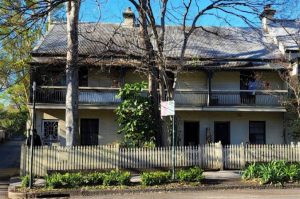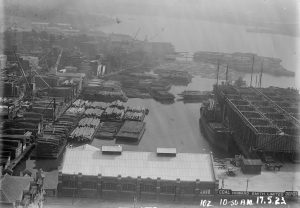by Lyn Collingwood, Bulletin 6/2022, August 2022

The sixth site nominated by the Glebe Society for a Blue Plaque is 148 St Johns Rd Glebe, the home of Lucy Eatock.
Lucy’s story recalls Glebe in the 1920s-1930s: the plight of the unemployed, the bitterness of industrial unrest, the informal network that supported the poor.
The Great Depression followed hard on the 1929 timber workers’ strike, which brought industrial unrest to Glebe where timber yards dominated the waterfront. There were violent clashes between local labourers and ‘scabs’ brought in from other districts by the mill owners.
Strikers were supported by a relief depot and soup kitchen set up by the Unemployed Workers’ Movement at 96 Glebe Point Rd. After ten months, the timber strike was broken, but the need for emergency relief continued. In 1932 ‘Old Mother Eatock’ was one of the volunteers supporting the soup kitchen, a familiar figure delivering blackberry pies and mutton to families of the unemployed.
The ninth child of a Presbyterian bushman, Lucy Harriet Wakenshaw married Aboriginal stockman William Eatock in 1895 in Queensland. They had nine children. Tired of living in tents and humpies, Lucy brought her youngest children to NSW and supported them by working as a domestic servant. In Sydney, three sons laboured at the St Peters brickyards, another was apprenticed to an electrician, and a daughter was employed in an umbrella factory. The family were active unionists and members of the Communist Party of Australia (CPA).

To be eligible for the dole, applicants had to fill in a form with 32 questions, many of which were seen as demeaning, and there was widespread opposition. In October 1932, a protest meeting outside Glebe Town Hall turned ugly when police tried to break it up.
Five of the demonstrators were arrested. Although a St Johns Rd grocer testified that Lucy’s youngest son Noel was not present at the disturbance, he received the longest sentence (2 ½ years) and lost an appeal. Lucy was bound over for offensive behaviour.
Lucy left the CPA, convinced that it had not done enough to support Noel and another son Alex who had been gaoled for resisting eviction from a Bankstown house. A few sympathisers shared her disillusionment; an Eatock Defence Committee sent Christmas hampers to both men in gaol.
Lucy died in Brisbane in February 1950, survived by five of her children.










There are no comments yet. Please leave yours.